Disclaimer: This article may contain the personal views and opinions of the author.
I learned a great deal about America by doing research for this part. I was going to paint the picture in big strokes - but after asking a few Americans, I have the impression that some of this might be unknown to some of you - and not part of the curriculum in the schools. So let’s take a look back at history before we continue with the build-up to WWII.
From 1763 to 1776 English Parliament, King George III, royal governors, and colonists clashed over regulations of trade, representation, and taxation. The English had an enormous debt and expected the colonists to share the burden. Beginning in 1763, Great Britain instituted a series of parliamentary acts for taxing the American colonies. One of these was The Currency Act of 1764 which ordered them to conduct all business in printed banknotes borrowed from the Bank of England (Rothschild) with interest.
By 1775 tensions reached a boiling point and the American Revolution started.
The Currency Act
Why was the English deeply indebted? Who did they owe money to?
As we saw in the previous parts, The Cabal initiated one war after another in Europe in the 17th century – many more than I’ve previously mentioned. So the English owed a lot of money to the Rothschilds.
I still have a thesis, that the Cabal is driven by
hate, contempt, revenge
an unquenchable thirst for power, control, and wealth
and that they want to destroy all religions but their own Satanism.
America won the Revolution (1783), and England was no longer able to squeeze money out of the colonies. The American Government established a value-based currency so the Private Banks could no longer skim the wealth of the people. I have no doubt that the Rothschilds swore revenge.
America had a few years free of the Cabal. Then the First Bank of United States was founded in 1791.
EDIT: When I first wrote this part, I wrote what I had found in several articles - that
the bank was founded due to the support of Alexander Hamilton, one of the founding fathers, founder of the Federalist Party, and the first Secretary of the Treasury. He was also the founder of The New York Post newspaper.
He was shot in 1804 in a duel with Vice President Aaron Burr.
But since then I have come across Historian Matt Ehret, who describes Hamilton in a much more favourable light. Matt claims that Aaron Burr was a Deep State puppet.
Quote From 30m00s here
There’s a lot of effort to rehabilitate Burr’s image. Burr is one of the more important entry points to begin to map out some of these American Patriots who are not American Patriots - who are actually anti-American … the Dulles personality types … the Averell Harriman personality types. […] George Washington didn’t trust him at all, fired him, because he was basically doing espionage, building up little cells of spies inside Washington’s army. But Washington - for some reason - couldn’t get rid of him.
It’s an interesting example of history probably being rewritten.
Burr - portraid as a hero who shot Hamilton, the traitor, who founded the Rothschild Bank - turns out to be anti-American, whereas Hamilton, according to Matt Ehret’s research:
Quote, Clash of the Two Americas
Alexander Hamilton had innovated a new form of political economy tied to large scale national credit generation via a nationally-directed banking system, internal improvements, and protective tariffs/bounties. This system of political economy was dubbed “The American System” by German Economist Friedrich List in 1827 […] and was used successfully to transform the republic from an underdeveloped bankrupt agrarian society in 1783 to an industrially advanced nation outperforming much of Great Britain within 40 years.
End Edit
At the end of the First Bank of United States’ 20-year charter (1811), it had almost ruined the nation’s economy and enriched the bank’s owners. As a result, Congress refused to renew the charter. That didn’t sit well with The Cabal.
“Either the application for renewal of the charter is granted, or the United States will find itself involved in a most disastrous war.” Nathan Mayer Rothschild
Nathan Mayer Rothschild was head of the Rothschild Bank of England. He now financed the Britain who marched to war in 1812 to recolonize the United States and force them back into the slavery of the Bank of England’s banknotes or to force the United States into so much debt they would have to accept the new private Central Bank. The plan worked. Even though America won the “War of 1812” – in 1815 – Congress signed a charter for another private bank, The Second Bank of United States.
The Cabal’s attempts to renew the charter of The Second Bank of United States were blocked by President Andrew Jackson (1829 – 1837.) He called them Satanic and vowed to route them out by the grace and power of Almighty God.
In his first term, he fired 2.000 of 11.000 employees of the Federal Government – which he deemed to be the Bank’s minions.
In 1832 President Jackson’s re-election was approaching and the Bank struck an early blow, hoping that Jackson would not want to stir up controversy. They asked Congress to pass a renewal bill 4 years early. Congress complied and sent it to the President for signing, but Jackson vetoed the bill. He succeeded in blocking the renewal of the charter. Although not without a fight. The Senate censured him – but did not move to Impeach him.
Then, for the first time in US history, Jackson took his Presidential campaign on the road. Before then, Presidential candidates stayed at home and looked Presidential. He ran for his second term as President under the slogan: Jackson and no Bank.
He was re-elected in a landslide. He ordered the Sec of Treasury to start removing the government’s deposits from the Second Bank and start placing them in state banks. He declined. Jackson fired him. The next Sec of Treasury received the same order. He also declined – and was fired. President Jackson then appointed Roger B Teney to the office. Teney did withdraw government funds from the Bank starting on October 1st, 1833.
Head of the bank, Nicholas Biddle used his influence to get the Senate to reject Teney’s nomination! In a show of arrogance, Bittle even threatened to cause depression, if the Bank was not rechartered.
So now we are beginning to see Cabal installed puppets in Government.
In 1791 the first Charter was signed. In 1811 Congress did the right thing: refused to renew the Charter. Then In 1815 Congress signed a Charter for a Second Bank, and in 1832 they were ready to sign a renewal 4 years early. And here, in 1833 Biddle has influence in the Senate.
Biddle threatens with creating Depression. So here we see what we are used to seeing in our time: The Cabal reveals their evil scheme. According to multiple sources, it has to do with their Lucifarian religion: They must reveal their plan and if we then get caught in their net it’s our own responsibility, our own fault.
Biddle made good of his treat. He contracted the money supply by calling in old loans and refusing to extend new ones. A depression followed and Biddle blamed Jackson.
Six months after he had withdrawn funds from the Bank, Jackson was officially censured by a resolution that passed the Senate by a vote of 26 to 20. It was the first time that a President had ever been censured by Congress.
Source about Jackson
If Congress could muster enough votes to override Jackson’s veto, the Bank would be granted another 20-year monopoly.
But then the tide shifted. The governor of Pennsylvania came out supporting Jackson and strongly criticized the Bank. On top of that, Biddle had been caught boasting in public about the Bank’s plan to crash the economy.
In April of 1834, the House of Representatives voted 134 to 82 against rechartering the Bank. They then set up a Committee to investigate if the Bank had caused the crash. Biddle refused to give up the books, nor would he allow inspection of correspondence with Congressmen, relating to their personal loans and advances he made to them.
In 1835 Jackson paid off the final installment of the national debt – as the only President ever to do that.
A few weeks later there was an assassination attempt – that failed.
The shooter was an unemployed housepainter from England, named Lawrence. Standing three paces away, he aimed a small pistol at President Jackson and pulled the trigger. Then he pulled a second pistol and fired. This gun also misfired. Legend says the President then attacked Lawrence with his cane. Others present disarmed him.
In the 1930’s, due to curiosity concerning the double misfires, researchers at the Smithsonian Institution tested and retested the pistols. Each time the pistols performed perfectly.
President Abraham Lincoln was the 16th President (1861 – 1865)
The financial dimensions of the Civil War (1861 – 1865) are not taught in school according to this video: “All wars are Bankers’ wars”
The Civil War is portrayed as an internal dispute over slavery. In fact, it was a war with global implications. The bankers offered to help Lincoln bring the South back into the Union – at 30% interest. Lincoln remarked that he would not free the black man by enslaving the white man to the bankers – and he then used his authority as President to issue a new Government currency, the Greenback.
The Greenback was a threat to the Central Bankers – and a victory over Lincoln would mean the end of the Greenback. So England and France considered an outright invasion of America.
Russia wrote to Lincoln that they would support him and it was put to the test in 1863 at Gettysburg - where one of the greatest displays of support for another country’s sovereignty occurred. Quote from Navy Historical Foundation Publication: “The Russian Navy visits the United States."
They didn't interfere, just had their ships up and down both the east and west coast. And thereby probably prevented English and French ships to interfere.
10 minutes MrTruthBomb video here, if you are interested
The Union won the war and Lincoln announced his intention to go on issuing the Greenbacks. He continued to fight against the central bank, and some now believe that it was his anticipated success in influencing Congress that was the motivating factor behind his assassination. On April 14, 1865, just days after the war's end, he was attending a play at Ford’s Theatre in Washington, DC, with his wife Mary when he was fatally shot. According to Wikipedia he was shut by Confederate sympathizer John Wilkes Booth. But who paid Booth to fire the gun?
From 1836 to 1913 The United States operated without a central bank and it was the most prosperous time of the country.
War after war killed millions, bankrupted nations, deposed royalty, left the people in despair and further enriched the Cabal/Illuminati alliance. The strategy for conquering the world and exacting revenge was proceeding according to plan.

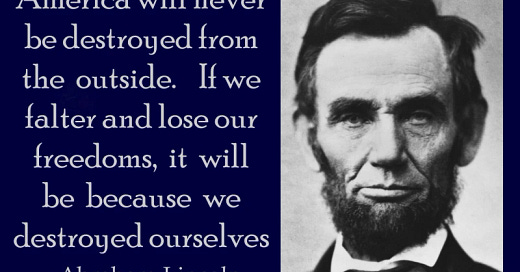



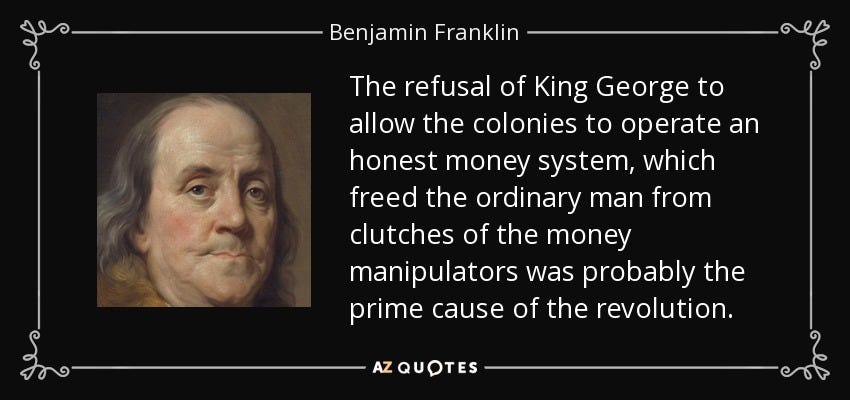
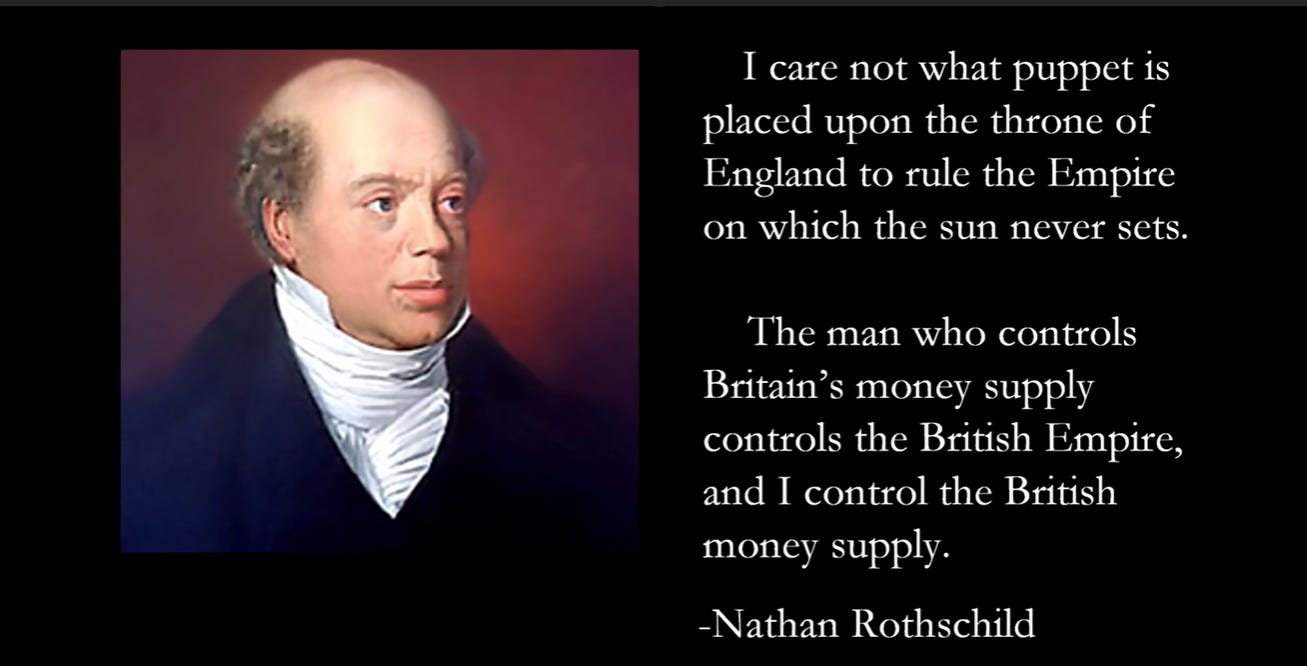

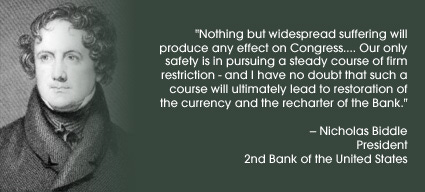
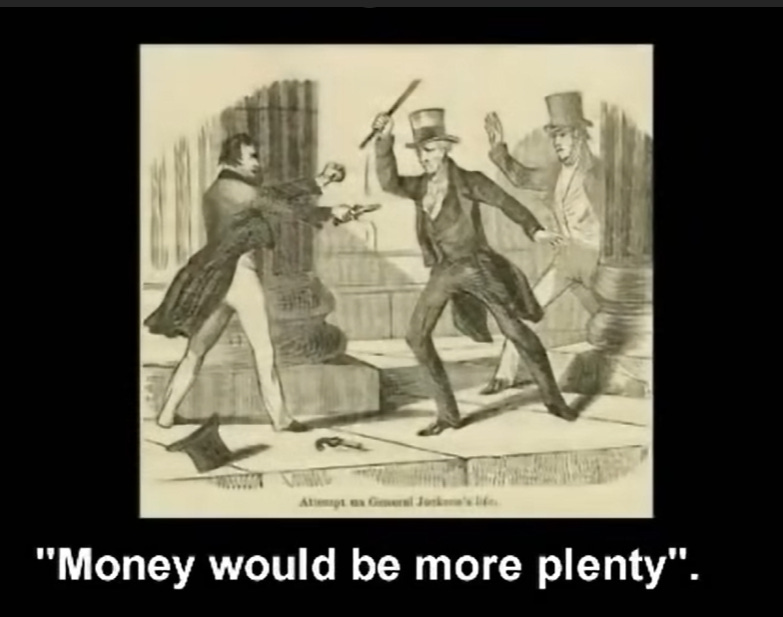
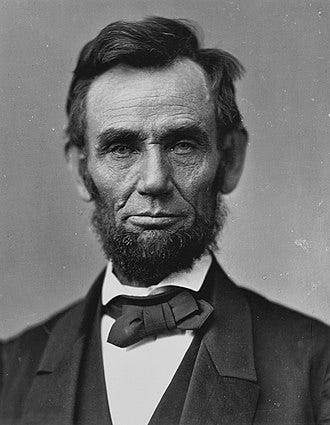



Reading this in 2025! I didn't find you until after this article was written. Good look into the early history of our central bank. I learned a bit more. The trading company that got us started controlled us from the beginning, guess it morphed into Rothschild control. Born and raised in Phila, I am aware of the 1st and 2nd national bank buildings in the downtown area and Hamilton's influence for such. I have learned how serious Andrew Jackson was about not having a central bank, the reason DJT admires him and has his portrait and statue on a desk in the Oval Office. I realize this is the goal, to get us out of the central bank slave-indebtedness Ponzi scheme. We are now into the first days of DJT's administration. Hoping I live to see this happen in the next 4 yrs and the world unleashed into prosperity! Thanks, Jytte, for referring me to this earlier work of yours!
Great article! I did not know about Lincoln issuing the greenbacks. Makes alot of sense with what's going on and has been going on in our country and the world.